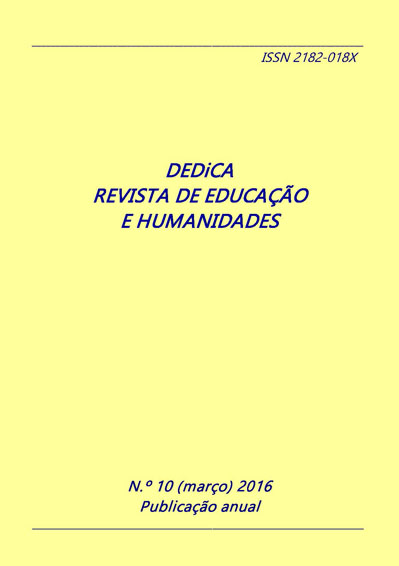El desarrollo de las competencias en los libros de texto de Educación Infantil. Cuestionario de valoración
DOI:
https://doi.org/10.30827/dreh.v0i10.6859Palabras clave:
Educación Infantil, competencias, libros de texto, profesoradoResumen
Este trabajo muestra una investigación basada en el Proyecto de Investigación Educativa de la Junta de Andalucía PIV-006/13, su objetivo principal ha sido analizar y evaluar las repercusiones pedagógicas que las Competencias Clave han introducido en los libros de texto de Educación Infantil. El origen de esta investigación redunda en la continua inquietud de las instituciones educativas de buscar una metodología que facilite la mejora y el cambio en pro de las necesidades, intereses y demandas de la ciudadanía actual y de nuestro alumnado en particular. En consecuencia, creemos que uno de los interrogantes clave en nuestro día a día en un aula de Educación Infantil es saber cómo han evolucionado y se han adaptado los libros de texto a los distintos cambios curriculares y, si dan respuesta al trabajo por Competencias que recoge el actual Currículo de Educación Infantil (MECD, 2006; 2014).
Para ello, hemos diseñado, aplicado y analizado un pretest a docentes de Educación Infantil donde queríamos conocer su opinión sobre cuatro de las principales editoriales de nuestro país. Este trabajo ha constado de un total de 73 ítems, centrándonos en los tres ámbitos de la Etapa, como son: Conocimiento de sí mismo y autonomía personal, Conocimiento del entorno y Lenguaje: comunicación y representación. Además, hemos evaluado una cuarta dimensión más, que hacía referencia a la metodología docente.
Descargas
Citas
Alvarado De Llanos, L. (2015). La vida social en las imágenes de los libros de texto en educación infantil. Trabajo Fin de Grado [TFG] sin publicar. Santander: Universidad de Cantabria.
Boyatzis, R. E. (1982). The competent manager: a model for effective managers. New York: John Wiley & Sons.
Delors, J. (1996). “Los cuatro pilares de la Educación”. En La Educación encierra un tesoro. Informe a la UNESCO de la Comisión internacional sobre la Educación para el siglo XXI. Madrid: Santillana.
Del Pozo, M. (2011). Inteligencias múltiples en acción. Barcelona: Tekman Books.
Fernández Reiris, A. (2004). El libro y su interrelación con otros medios de enseñanza. Buenos Aires: Miño y Dávila.
Fernández Reiris, A. (2005). La importancia de ser llamado “libro de texto”. Hegemonía y control del curriculum en el aula. Buenos Aires: Miño y Dávila.
Le Boterf, G. (2001). Ingeniería de las competencias. Barcelona: Gestión 2000.
McClelland, D. C. (1973). Testing for competencies rather than intelligence. American Psychologist, 28, p.1.
MECD (2006). Ley Orgánica 2/2006, de 3 de mayo, de Educación. (LOE). Madrid.
MECD (2014). Ley Orgánica 8/2013, de 9 de diciembre, para la mejora de la calidad educativa (LOMCE). Madrid.
Martínez Bonafé, J. M. (2002). Políticas del libro de texto escolar (Vol. 9). Madrid: Morata.
Martínez Bonafé, J. (2007). El libro de texto, ¿un recurso para la innovación educativa? Aula de innovación educativa, 15(165), 12-14.
Molina, M. D.; Pérez García, A.; Antiñolo, J. L. (2012). Las TIC en la formación inicial y en la formación permanente del profesorado de infantil y primaria. EDUTEC, Revista Electrónica de Tecnología Educativa, 41. Disponible en:
OCDE (2003). The PISA 2003 Assessment Framework: Mathematicas, Reading, Science and Problem Solving Knowledge and Skills. París: OECD.
Organización Internacional del Trabajo -OIT- (2004). Recomendación sobre el desarrollo de los recursos humanos. Recomendación 1995. Ginebra: OIT.
Pro, A. (2008). Jugando con los circuitos y la corriente eléctrica. En E. Banet Hernández; V. Carbó Cortina; J. M. Domínguez Castiñeiras et al.. El desarrollo del pensamiento científico y técnico en la Educación Primaria, 43-82. Madrid: ISFP.
Rodríguez, J. (2012). Diseño, aplicación y evaluación de una propuesta didáctica para trabajar la temática de la energía en Educación Primaria. Tesis de Maestría, sin publicar. Murcia: Universidad de Murcia.
Rodríguez, J. (en prensa). Jugando con los Circuitos Eléctricos: un estudio de una propuesta didáctica desde la perspectiva del desarrollo por Competencias. 3º Premio de Investigación Educativa “Antonio Domínguez Ortíz”. Sevilla: Consejería de Educación. Junta de Andalucía.
Torres, J. (2011). Infantilización. En J. Torres, La justicia curricular. El caballo de Troya de la cultura escolar, 251-255. Madrid: Morata.
Vieites (2009). Programación por Competencias en Educación Infantil. Vigo: Ideasproias Editorial.
WCEFA (1990). World Declaration on Education for All and framework for action to meet basic learning needs. New York: WCEFA. Disponible en: http://www.unesco.org/education/efa/ed_for_all












